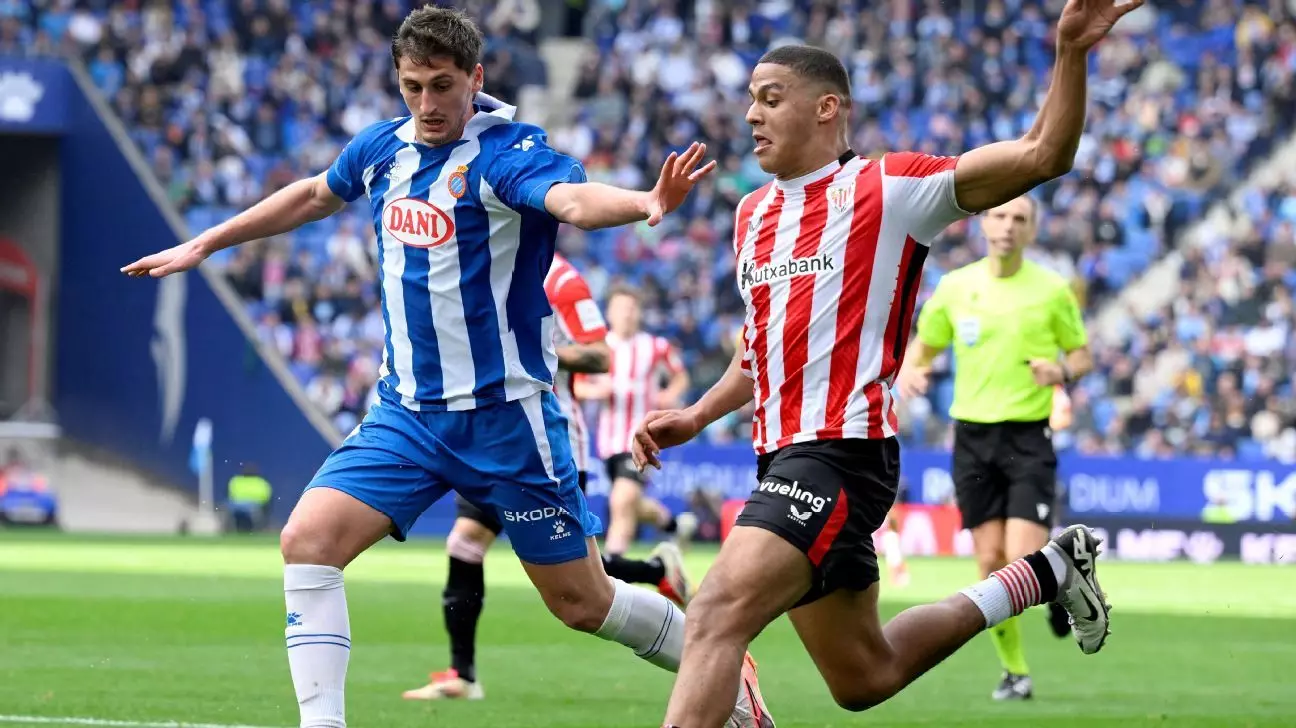The world of football, heralded for its spirit of unity and competition, continues to grapple with an unsettling reality—racism within stadiums. A recent incident during a LaLiga match between Espanyol and Athletic Club laid bare this ongoing struggle. The game, which ended in a 1-1 draw, was marred by alleged racist chants directed towards Athletic Club forward Maroan Sannadi. This event underlined the urgent necessity for meaningful action against racism in sports, highlighting not only the incidents themselves but also the broader implications for society and the football community.
The distressing episode unfolded in the 17th minute when Sannadi became the target of malicious taunts from Espanyol fans. In response to these derogatory chants, referee Guillermo Cuadra Fernández activated LaLiga’s anti-racism protocol, bringing a temporary halt to the match. This protocol entails broadcasting a message through the stadium’s PA system to inform supporters about the nature of the disruption, and underscores the seriousness with which such incidents are treated. Players are warned that continued offenses could lead to the game’s suspension or outright abandonment.
The involvement of Iñaki Williams, Sannadi’s teammate, complicates the narrative further. Initially, it appeared that he was the recipient of the abuse, as he alerted the officials to the situation. However, Williams clarified that Sannadi, who possesses Moroccan heritage, was the actual target of the discriminatory remarks. This distinction emphasizes the personal toll that such incidents take not only on the affected player but also on those who stand in solidarity with their teammates. The sense of dismay and frustration permeating Williams’ remarks encapsulates the emotional burden of experiencing or witnessing racism in sports: “You come to football to enjoy yourself,” he stated, reflecting the disillusionment that accompanies such hate-filled outbursts.
Following the match, both Athletic Club and Espanyol expressed their condemnation of racism. Espanyol’s official statement reiterated their opposition to any form of racist display within football, indicating a recognition of the problem that transcends individual clubs and affects the sport as a whole. Nevertheless, the challenge remains—while statements of condemnation are essential, they must be accompanied by tangible actions against the perpetrators of such behaviors.
The protocol enacted during the match is vital; it represents a procedural commitment to tackling racism. However, as Athletic coach Ernesto Valverde noted, the very existence of such protocols points to a larger societal issue. While he praised the referee for taking swift action, he lamented that any player—regardless of their affiliation—should have to endure such treatment in any stadium. Valverde’s sentiments reflect a deep-seated frustration among many supporters and players alike, who desire a footballing environment free from racial abuse.
Racism in football is a troubling trend, not limited to isolated incidents but rather characterized by a disturbing pattern. Numerous players, including Iñaki Williams, have faced similar hostility during games. Williams previously reported being subjected to monkey noises at the RCDE Stadium back in 2020, an indication that such occurrences are not just fleeting moments. Moreover, the soccer community has witnessed significant cases involving high-profile players like Vinícius Júnior, who has consistently battled against racial abuse from stands up and down the country.
Steps have been taken to hold aggressors accountable, demonstrated by recent legal actions against fans who engaged in discriminatory behavior. In notable cases, individuals have been jailed for their actions, signaling a growing awareness and intolerance of racism in Spanish football. Yet, despite these measures, the recurrence of racist incidents raises questions about the effectiveness of current systems in place.
Addressing racism in football requires a multi-faceted approach involving players, clubs, governing bodies, and fans. Condemnations of such behavior must be paired with stringent actions against offenders and education campaigns aimed at fostering a culture of inclusivity within the sport. The response from the football community must be unified and resolute; systemic change can only happen if every stakeholder recognizes their role in combating racism. As we continue to witness incidents of racial abuse, it becomes imperative that we strive toward a future where the beautiful game reflects the values of respect, dignity, and equality for all.

